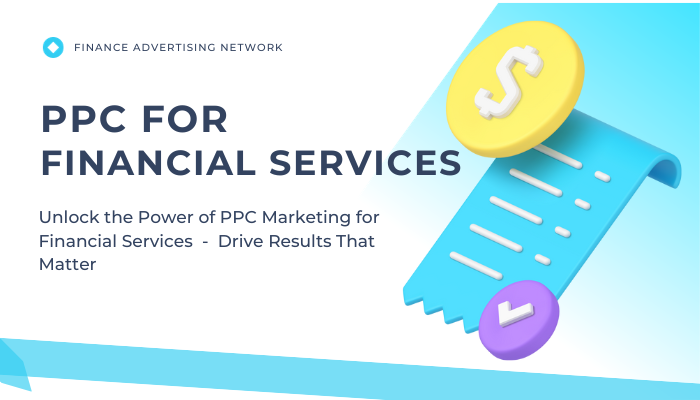In the rapidly evolving landscape of financial services, staying ahead of the competition is a perpetual challenge. Today, the success of financial institutions largely depends on their digital marketing strategies. One such strategy that has been gaining prominence is Pay-Per-Click advertising, commonly known as PPC. In this article, we'll delve into the world of PPC for financial services and explore how it can revolutionize your marketing efforts.

What Actually PPC Is
Advertisers that use the Pay-Per-Click (PPC) digital advertising strategy must pay a fee each time their ad is clicked. It's a method of purchasing website visitors as opposed to trying to obtain them naturally.
Financial ads are displayed on search engines, social media platforms, and websites. Advertisers place bids on particular service-related keywords. When a user searches for those keywords, the ads are displayed. If the user clicks the ad, the advertiser is charged, hence the name Pay-Per-Click.
Why is PPC Important for Financial Services?
Pay-per-click (PPC) advertising is a very efficient method of increasing website traffic and conversions. For financial services, it can be a powerful tool to build brand recognition and attract leads quickly. Here are some reasons why PPC is important for financial services:
Real-time control:
PPC advertising allows you to have real-time control over your ad spend, ad targeting, and ad copy. This means that you can optimize your ad performance to improve returns.
Brand awareness:
PPC can help you achieve extensive brand exposure and thought leadership.
Regulations:
Financial products and services are highly regulated industries. Google suggests that when creating ads, you make sure to comply with local, state, and national regulations. This might involve certain disclosures that offer clarity on the goods or services that the advertisement highlights.
Quick results:
PPC advertising can help you attract leads quickly and drive conversions for your finance-based services.
Benefits of PPC for Financial Services
Targeted Marketing
PPC allows financial institutions to target specific demographics, locations, and even the time of day when their ads are displayed. This accuracy guarantees that the appropriate audience receives your message at the appropriate moment.
Measurable Results
Financial Ads Platforms provide detailed analytics, allowing you to measure the performance of your campaigns. You can track clicks, impressions, conversions, and more. This data helps in refining your strategies for better results.
Crafting a Successful PPC Campaign
Keyword Research
The foundation of a successful PPC campaign is extensive keyword research. Identify the keywords that potential customers might use when searching for financial services. Tools like Google Keyword Planner can be instrumental in this process.
Compelling Ad Copy
Your ad copy needs to be attention-grabbing and informative. Highlight the unique selling points of your financial services, such as low-interest rates, quick approvals, or personalized solutions.
Landing Page Optimization
Ensure that the landing page your ad leads to is well-optimized. It should provide the information that the user is looking for and have a clear call to action.
Choosing the Right PPC Platform
Choosing the right Finance Advertising Platform is crucial for businesses to reach their target audience and achieve their marketing goals. A good PPC platform can help businesses to create and display ads to the most appropriate audience for their business, thereby increasing the chances of conversion.
PPC platform can help businesses to uncover and eliminate wasted spend as well as improve metrics like Quality Score that have a big impact on their bottom line. It can also help businesses to squeeze every penny of budget for better return-on-ad-spend (ROAS).
If you are looking for a PPC platforms that can help you in promoting finance, you should consider exploring some of the best financial advertising agencies available in 2024:
Google Ads
Google Ads is one of the most popular PPC platforms. It allows you to display ads on Google's search results and partner websites. Given Google's vast reach, it's a great platform for financial services.
7Search PPC
7Search PPC offers a range of benefits for advertisers with the best financial ad network. Advertisers use this platform to bid on keywords related to their financial services and display their ads to people actively searching for those terms. The platform presents different tools to help advertisers set their campaign goal, select countries to target, and set their bid to reach the audience quickly.
Conclusion
In the ever-competitive world of financial services, PPC offers a powerful tool to revolutionize your marketing efforts. Its precision, cost-effectiveness, and measurable results make it an invaluable strategy for financial institutions looking to stay ahead of the curve.
By conducting thorough keyword research, creating compelling ad copy, and choosing the right PPC platforms, you can ensure that your financial services reach the right audience at the right time. Embrace the future of marketing, and harness the potential of PPC for financial services to new heights.
FAQs
Q: Why do banks promote credit cards?
Ans: Banks promote credit cards for a number of reasons, including:
- To attract new customers
- To increase customer spending
- To build customer loyalty
Q: Who are private banking clients?
Ans: Private banking clients are high-net-worth individuals (HNWIs) who have substantial assets and income. The minimum net worth required to qualify for private banking services varies from bank to bank, but it is typically at least $1 million. Some banks set the minimum threshold much higher, at $5 million or $10 million.
Q: How to promote banking in rural areas?
Ans: There are a number of ways to promote banking in rural areas, including:
Increase access to banking services:
This can be done by opening new bank branches in rural areas, or by partnering with existing businesses, such as post offices and grocery stores, to offer banking services.
Educate rural residents about the benefits of banking:
Many rural residents are not aware of the benefits of banking, such as the security of their deposits and the ability to access loans. Banks can educate rural residents about these benefits through financial literacy programs and other outreach initiatives.














